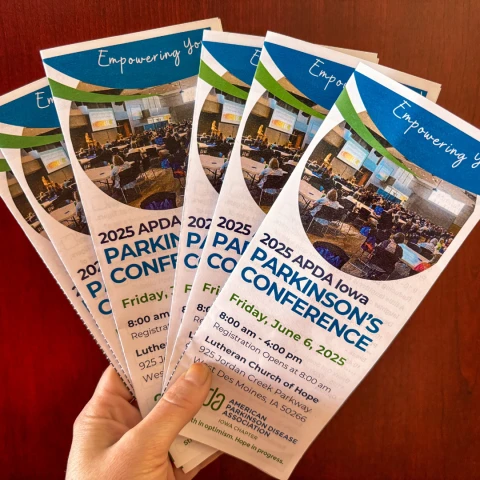
April: Parkinson's Disease Awareness Month
April marks Parkinson's Disease Awareness Month, a dedicated time to raise awareness and support for those impacted by this neurodegenerative disorder. With an estimated one million Americans living with Parkinson's disease (PD), as reported by the American Parkinson Disease Association, increasing awareness is essential. As the saying goes, "knowledge is power"—the more informed we are, the better we can support ourselves, friends, and loved ones who may be affected by the disease.
At Senior Helpers of Central Iowa, we have a strong partnership with the American Parkinson Disease Association (APDA) Iowa Chapter, even sharing office space in Urbandale, Iowa. We deeply value the important work they do and the support they offer to our local community, especially as our particular Senior Helpers office specializes in providing personalized in-home care for those living with Parkinson’s disease. In this article, we’ll explore what Parkinson's is, ways to manage the condition, and valuable resources for continued education.
Understanding Parkinson's Disease
Parkinson's disease is a progressive neurological condition that primarily affects movement. Common motor symptoms include tremors, rigidity, bradykinesia (slowed movement), and postural instability. However, PD also encompasses non-motor symptoms such as sleep disturbances, depression, and cognitive changes. The exact cause of Parkinson's remains unknown, but it is believed to result from a combination of genetic and environmental factors.
Living with Parkinson's Disease
Managing Parkinson's in an effective manner involves a comprehensive approach that includes medication, regular exercise, a balanced diet, and mental health support. Engaging in physical activities tailored to individual abilities can significantly improve mobility and overall physical, mental, and emotional well-being. Additionally, building a strong support system with healthcare providers and local support groups can offer invaluable assistance.
How to Get Involved During Parkinson's Awareness Month
There are several ways to participate and make a difference this April:
- Educate Yourself and Others: Learn about Parkinson's disease and share information, such as this blog post or key websites (listed below) to promote understanding.
- Support Research and Advocacy: Contribute to organizations dedicated to Parkinson's research and patient support. The American Parkinson Disease Association (APDA) offers numerous resources and opportunities for involvement.
- Participate in Events: Join local or virtual events aimed at raising awareness and funds for Parkinson's research and support services. Coming up in our area are two great opportunities to take advantage of:
- Join the 2025 Iowa Optimism Walk on Saturday, September 20th at Walker Johnston Park - Giovannetti Shelter. Visit www.apdaparkinson.org/ia to learn more!
- Register for the 2025 APDA Iowa Parkinson’s Conference – the largest APDA conference in the country! This years conference will be on Friday, June 6 from 8:00am-4:00pm. To register visit www.apdaparkinson.org/ia or call 515-207-6296 for more information.
- Wear Blue on World Parkinson's Day: April 11th is World Parkinson's Day. Show solidarity by wearing blue and sharing your support on social media platforms.
Resources for Further Information
For those seeking more information or support, consider exploring the following resources:
- American Parkinson Disease Association (APDA): Provides education, support, and research funding to help individuals with PD live life to the fullest.
- Parkinson's Foundation: Offers resources and guides, including "PAM," your guide to Parkinson's Awareness Month, to help raise awareness and provide essential tips.
- Local Support Groups: Connecting with others facing similar challenges can provide emotional support and practical advice. The APDA website can help you find local resources.
- Senior Helpers: Provides custom, tailored in-home care services for individuals living with PD.
By increasing awareness and supporting ongoing research and community initiatives, we can work together to improve the lives of those affected by Parkinson's disease.